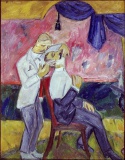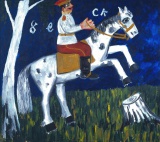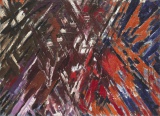Difference between revisions of "Mikhail Larionov"
m (Text replacement - "libgen.rs" to "libgen.is") |
|||
| (38 intermediate revisions by the same user not shown) | |||
| Line 1: | Line 1: | ||
| − | + | {{Infobox artist | |
| + | |image = Natalia_Goncharova_Mikhail_Larionov_1913-14.jpg | ||
| + | |imagesize = 338px | ||
| + | |caption = Natalia Goncharova and Mikhail Larionov in the workshop of the Bolshoi Theatre working on preparations for ''Le Coq d’or'', 1913-14. | ||
| + | |birth_date = {{birth date|1881|6|3|mf=y}} | ||
| + | |birth_place = Tiraspol, Kherson Governorate, Russian Empire (now Moldova) | ||
| + | |death_date = {{Death date and age|1964|5|10|1881|6|3|mf=y}} | ||
| + | |death_place = Fontenay-aux-Roses near Paris, France | ||
| + | |collections = [[Pompidou::{{Pompidou|cBKMA4K/rpg9xrn}}|Pompidou]] 87, [http://collections.vam.ac.uk/name/larionov-mikhail/15770/ V&A] 79, [[MoMA::{{MoMA|3389}}|MoMA]] 28, [[Tretyakov::{{Tretyakov|103}}|Tretyakov]] 16, [[Tate::{{Tate|michel-larionov-1468}}|Tate]] 5, [[Thyssen::{{Thyssen|325}}|Thyssen]] 4, [[Costakis::{{Costakis|Larionov%20Mikhail}}|Costakis]] 3, [[Artic::{{Artic|55265}}|Artic]] 3,[[Guggenheim::{{Guggenheim|mikhail-larionov}}|Guggenheim]] 1, [http://www.imj.org.il/imagine/collections/AZSearch.asp?let=L&artist=Larionov,%20Michel,%20Russian,%20188 IM Jerusalem] 1, [http://www.gmurzynska.com/artists/mikhail-larionov Gmurzynska] 1, [[RGALI::{{RGALI|10884965}}|RGALI]] | ||
| + | }} | ||
| + | '''Mikhail Fiodorovich Larionov''' [Михаил Фёдорович Ларионов, 1881–1964) was an avant-garde Russian painter. | ||
| − | + | {{TOC limit|3}} | |
| − | + | Born 1881 in Tiraspol. He was the son of Fiodor Mikhailovich Larionov, a doctor and a pharmacist, and Aleksandra Fiodorovna Petrovskaia, but he grew up in his grandparents' home in Tiraspol. He attended the Voskresenskii Technical High School in Moscow and in 1898 entered the Moscow School of Painting, Sculpture and Architecture under Isaac Levitan and Valentin Serov. Here he met [[Natalia Goncharova]] in 1900, who remained his lifelong companion. His work soon caught the attention of colleagues and critics and in 1906 he was invited to exhibit with the Union of Russian Artists and to participate in the Russian Art exhibition at the Salon d'Automne in Paris. When Larionov met [[Nikolai Riabushinskii]], editor of the ''[[Zolotoe runo]]'' [the Golden Fleece], the famous art mecenas became the artist's chief patron and in 1908 helped him organize the ''Golden Fleece'' exhibition of the modern French painting in Moscow, which included paintings by international avant-garde artists such as Matisse, Derain, Braque, Gauguin and Van Gogh. As a result of this exhibition, many artists, including Larionov, turned away from Symbolism and started to experiment with Post-Impressionism. In 1910, Larionov was expelled by the Moscow School of Painting for organizing a demonstration against the school's teaching methods. He was the founder of the [[Jack of Diamonds]] group (1909-1911), and with them he exhibited a remarkable series of paintings, among them the ''Soldiers'' (1910), created during his military service. His first solo show was for one day in Moscow in 1911. The artist soon deserted the [[Jack of Diamonds]] for the more radical [[Donkey's Tail]] (1912-1913), which held an exhibition in 1912. He gave names to both groups. In 1912 he initiated two very important movements: [[Rayism]] (Rayonism; Luchism) and [[Neo-primitivism]]. Rayonism was inspired by [[Futurism#Italy|Italian Futurism]] and Neo-primitivism and represented a development of the artist's Fauvist and [[Expressionism|Expressionist]] interests. | |
| − | |||
| − | |||
| − | |||
| − | |||
| − | |||
| − | |||
| − | |||
| − | |||
| − | |||
| − | ; | + | Rayism was officially launched at the ''Target'' exhibition of 1913. In 1914 he traveled with Goncharova to Paris. They held an exhibition at the Gallerie Paul Guillaume. When the war began, they returned to Russia and Larionov was drafted into the army. He was injured in the battle of the Masurian Lakes and spent three months in a hospital. The injury affected his ability to concentrate and resulted in the decline of his artistic energy. In 1915 he traveled with Goncharova to Switzerland, at the request of [[Sergei Diaghilev]]. There he designed for the ballet and gained success. While traveling through Spain and Italy he designed three more ballets, all equally successful. In 1919 he settled permanently in Paris, where he acted as Goncharova's manager. He spent the rest of his life in France and obtained the French citizenship. Throughout the decade he worked with Diaghilev as a designer and artistic adviser. Following Diaghilev's death in 1929, he resumed painting and also worked occasionally for the ballet. He and Goncharova were granted French citizenship in 1938. In 1950 he suffered a stroke that seriously handicapped his activity and he spent the last 14 years of his life in poverty. Died 1964 in Fontenay-aux-Roses, near Paris. |
| + | |||
| + | ==Works== | ||
| + | <gallery> | ||
| + | Larionov_Mikhail_1907_Barber.jpg|''Barber'', 1907. Oil on canvas. [http://en.rusmuseum.ru/collections/painting-of-the-second-half-of-the-xix-century-beginning-of-xxi-century/artworks/parikmakher/ State Russian M]. | ||
| + | Larionov Mikhail 1911c Soldier on a Horse.jpg|''Soldier on a Horse'', c1911. Oil paint on canvas. Support: 87 x 99,1 cm, frame: 101,4 x 113,1 x 6,5 cm. [http://www.tate.org.uk/art/artworks/larionov-soldier-on-a-horse-t00767 Tate]. | ||
| + | Larionov_Mikhail_1912_Venus.jpg|''Venera (Venera i Mikhail)'' [Венера (Венера и Михаил); Venus], 1912. Oil on canvas. 83 x 100 cm. State Russian M. | ||
| + | Larionov Mikhail 1912 Glass.jpg|''Steklo'' [Glass], 1912. Oil on canvas. 104.1 x 97.1 cm. [http://www.guggenheim.org/new-york/collections/collection-online/artwork/2408 Guggenheim]. | ||
| + | Larionov Mikhail 1912-13 Rayonist Composition Domination of Red.jpg|''Rayonist Composition: Domination of Red'', 1912-13. Oil on canvas. 52.7 x 72.4 cm. [http://www.moma.org/collection/works/78586?locale=en MoMA]. | ||
| + | </gallery> | ||
| + | |||
| + | ==Publications== | ||
| + | * {{a|Larionov1913}} Larionov, et al., ''[[Media:Larionov_Mikhail_et_al_Oslinyi_khvost_i_mishen.pdf|Oslinyi khvost i Mishen]]'' [Ослиный хвост и мишень; Donkey's Tail and Target], Moscow: Ts.A. Miunster (Ц.А.Мюнстер), Jul 1913, 151 pp, [http://elib.shpl.ru/ru/nodes/3568-oslinyy-hvost-i-mishen-m-1913 JPGs]. [http://www.bibliophika.ru/book.php?book=3608] {{ru}} | ||
| + | ** with Natalia Goncharova, [http://monoskop.org/images/e/e6/Larionov_Mikhail_et_al_Oslinyi_khvost_i_mishen.pdf#page=11 "Luchisty i budushchniki. Manifest"], pp 9-48; repr. in ''Manifesty i programmy russkich futuristov'', ed. Vladimir Markov, Munich: Wilhelm Fink, 1967, pp 175-178. {{ru}} | ||
| + | *** trans., in Tatiana Loguine, ''Gontcharova et Larionov'', Paris: Klincksieck, 1971, pp 29-32. {{fr}} | ||
| + | *** [[Media:Larionov_Mikhail_Goncharova_Natalya_1913_1976_Rayonists_and_Futurists_A_Manifesto.pdf|"Rayonists and Futurists: A Manifesto"]], in ''Russian Art of the Avant-Garde: Theory and Criticism, 1902-1934'', ed. & trans. John E. Bowlt, New York: Viking Press, 1976, pp 87-91, n302. [http://www.mariabuszek.com/kcai/ConstrBau/Readings/RayonFuturMnfsto.pdf] {{en}} | ||
| + | ** [http://monoskop.org/images/e/e6/Larionov_Mikhail_et_al_Oslinyi_khvost_i_mishen.pdf#page=89 "Luchitskaya zhivopis"], pp 83-124. Signed and dated Moscow, Jun 1912. Alternate version printed as Larionov, ''Luchizm'' [Лучизм], Moscow, 1913 [or Jun 1912?]. [http://www.liveauctioneers.com/item/6927957] | ||
| + | *** trans., in Waldemar George, ''Larionov'', Paris: La Bibliotheque des arts, 1966, pp 110-112. {{fr}} | ||
| + | *** "Rayonistische Malerei", in Waldemar George, ''Larionov'', Luzern adn Frankfurt: Bucher, 1968, pp 111-113. {{de}} | ||
| + | *** [[Media:Larionov_Mikhail_1913_1976_Rayonist_Painting.pdf|"Rayonist Painting"]], in ''Russian Art of the Avant-Garde: Theory and Criticism, 1902-1934'', ed. & trans. John E. Bowlt, New York: Viking Press, 1976, pp 91-100, n302-303. {{en}} | ||
| + | |||
| + | * with Ilya Zdanevich, "Why We Paint Ourselves: A Futurist Manifesto" [Dec 1913], in ''Russian Art of the Avant-Garde: Theory and Criticism, 1902-1934'', ed. & trans. John E. Bowlt, New York: Viking Press, 1976. {{en}} | ||
| + | |||
| + | * Eli Eganbyuri (Эли Эганбюри), ''[http://elib.shpl.ru/ru/nodes/3566-eganbyuri-eli-nataliya-goncharova-mihail-larionov-m-1913 Natalia Goncharova. Mikhail Larionov]'' [Наталия Гончарова. Михаил Ларионов], illustr. Ilya Zdanevich, Moscow: Miunster (Мюнстер), 1913, 39+54+22 pp. {{ru}} | ||
| + | |||
| + | * "La Rayonnisme pictural", ''Monjoie!'' 4-6 (Spring 1914), p 15. {{fr}} | ||
| + | ** "Pictorial Rayonism", in ''Russian Art of the Avant-Garde: Theory and Criticism, 1902-1934'', ed. & trans. John E. Bowlt, New York: Viking Press, 1976. {{en}} | ||
| + | |||
| + | * ''Manifestes''. {{fr}} | ||
| + | ** ''[http://www.maldororediciones.eu/pdfs/maldororediciones_larionov_manifiestos.pdf Manifiestos]'', trans. Jorge Segovia, Maldoror, 2009. {{es}} | ||
| + | |||
| + | ==Literature== | ||
| + | * Magdalena Dabrowski, [http://www.jstor.org.sci-hub.st/stable/775991 "The Formation and Development of Rayonism"], ''Art Journal'' 34:3 (Spring 1975), pp 200-207. {{en}} | ||
| + | * Anthony Parton, [http://sci-hub.st/10.2307/1574956 "Russian 'Rayism', the Work and Theory of Mikhail Larionov and Natalya Goncharova 1912-1914: Ouspensky's Four-Dimensional Super Race?"], ''Leonardo'' 16:4 (Autumn 1983), pp 298-305. {{en}} | ||
| + | * Anthony Parton, ''[http://hdl.handle.net/10443/341 Mikhail Fedorovich Larionov (1881-1964): A Study of the Chronology and Sources of His Art]'', Newcastle University, 1985. PhD dissertation. | ||
| + | * Michel Draguet, "Mikhail Larionov et l'abstraction: Le pneumo-rayonnisme dans la peinture européenne des années 1910", ''Annales d'histoire de l'art et d'archéologie'' 10 (1988), pp 67-86. {{fr}} | ||
| + | * Anthony Parton, ''Mikhail Larionov and the Russian Avant-Garde'', Princeton University Press, 1993, 254 pp; London: Thames & Hudson, 1993. Reviews: [http://sci-hub.st/10.1111/j.1467-8357.1994.tb00009.x Railing] (ArtBook 1994), [http://muse.jhu.edu.sci-hub.st/journals/modernism-modernity/v002/2.1br_parton.html Nisbet] (ModMod 1995), [http://sci-hub.st/10.2307/3051325 Gough] (ArtBull 1998). {{en}} | ||
| + | * Sarah Warren, [http://sci-hub.st/10.1093/oxartj/26.1.25 "Spent Gypsies and Fallen Venuses: Mikhail Larionov's Modernist Primitivism"], ''Oxford Art Journal'' 26:1 (2003), pp 25-44. {{en}} | ||
| + | * Elitza Dulguerova, [http://journals.ub.uni-heidelberg.de/index.php/kb/article/viewFile/11604/5459 "L'art autonome in situ. Pensée de l'exposition chez Mikhaïl Larionov (Moscou 1913)"], ''kritische berichte'' 33:3, 2005, pp 28-39. {{fr}} | ||
| + | * Sarah Warren, ''Mikhail Larionov and the Cultural Politics of Late Imperial Russia'', Ashgate, 2013. [http://books.google.com/books?id=0-W112v-ot8C&printsec=frontcover] {{en}} | ||
| + | * Sara Pankenier Weld, "Infant Art: Mikhail Larionov, Children’s Drawings, and Neo-Primitivist Art", ch 1 in Weld, ''[http://libgen.is/book/index.php?md5=D3ADC0161A328EB1B6C74E2B7A5BCBD3 Voiceless Vanguard: The Infantilist Aesthetic of the Russian Avant-Garde]'', Northwestern University Press, 2014, pp 19-61. {{en}} | ||
| + | * Elitza Dulguerova, "Institution précaire", part 2 in Dulguerova, ''Usages et utopies – L’exposition dans l’avant-garde russe prérévolutionnaire (1900-1916)'', Dijon: Les presses du réel, 2015. [http://www.lespressesdureel.com/EN/ouvrage.php?id=1228&menu=] {{fr}} | ||
| + | |||
| + | ==See also== | ||
| + | * [[Natalia Goncharova]] | ||
| + | * [[Donkey's Tail]] | ||
| + | * [[Russia#Avant-garde]] | ||
| + | |||
| + | ==Links== | ||
* http://www.expo-larionov.org/ | * http://www.expo-larionov.org/ | ||
| + | * http://www.pv-gallery.com/author/1552/Larionov-M-F/ | ||
* http://en.wikipedia.org/wiki/Mikhail_Larionov | * http://en.wikipedia.org/wiki/Mikhail_Larionov | ||
| + | |||
| + | {{DEFAULTSORT:Larionov, Mikhail}} | ||
Latest revision as of 09:29, 1 November 2024
 Natalia Goncharova and Mikhail Larionov in the workshop of the Bolshoi Theatre working on preparations for Le Coq d’or, 1913-14. | |
| Born |
June 3, 1881 Tiraspol, Kherson Governorate, Russian Empire (now Moldova) |
|---|---|
| Died |
May 10, 1964 (aged 82) Fontenay-aux-Roses near Paris, France |
| Collections | Pompidou 87, V&A 79, MoMA 28, Tretyakov 16, Tate 5, Thyssen 4, Costakis 3, Artic 3,Guggenheim 1, IM Jerusalem 1, Gmurzynska 1, RGALI |
Mikhail Fiodorovich Larionov [Михаил Фёдорович Ларионов, 1881–1964) was an avant-garde Russian painter.
Contents
Born 1881 in Tiraspol. He was the son of Fiodor Mikhailovich Larionov, a doctor and a pharmacist, and Aleksandra Fiodorovna Petrovskaia, but he grew up in his grandparents' home in Tiraspol. He attended the Voskresenskii Technical High School in Moscow and in 1898 entered the Moscow School of Painting, Sculpture and Architecture under Isaac Levitan and Valentin Serov. Here he met Natalia Goncharova in 1900, who remained his lifelong companion. His work soon caught the attention of colleagues and critics and in 1906 he was invited to exhibit with the Union of Russian Artists and to participate in the Russian Art exhibition at the Salon d'Automne in Paris. When Larionov met Nikolai Riabushinskii, editor of the Zolotoe runo [the Golden Fleece], the famous art mecenas became the artist's chief patron and in 1908 helped him organize the Golden Fleece exhibition of the modern French painting in Moscow, which included paintings by international avant-garde artists such as Matisse, Derain, Braque, Gauguin and Van Gogh. As a result of this exhibition, many artists, including Larionov, turned away from Symbolism and started to experiment with Post-Impressionism. In 1910, Larionov was expelled by the Moscow School of Painting for organizing a demonstration against the school's teaching methods. He was the founder of the Jack of Diamonds group (1909-1911), and with them he exhibited a remarkable series of paintings, among them the Soldiers (1910), created during his military service. His first solo show was for one day in Moscow in 1911. The artist soon deserted the Jack of Diamonds for the more radical Donkey's Tail (1912-1913), which held an exhibition in 1912. He gave names to both groups. In 1912 he initiated two very important movements: Rayism (Rayonism; Luchism) and Neo-primitivism. Rayonism was inspired by Italian Futurism and Neo-primitivism and represented a development of the artist's Fauvist and Expressionist interests.
Rayism was officially launched at the Target exhibition of 1913. In 1914 he traveled with Goncharova to Paris. They held an exhibition at the Gallerie Paul Guillaume. When the war began, they returned to Russia and Larionov was drafted into the army. He was injured in the battle of the Masurian Lakes and spent three months in a hospital. The injury affected his ability to concentrate and resulted in the decline of his artistic energy. In 1915 he traveled with Goncharova to Switzerland, at the request of Sergei Diaghilev. There he designed for the ballet and gained success. While traveling through Spain and Italy he designed three more ballets, all equally successful. In 1919 he settled permanently in Paris, where he acted as Goncharova's manager. He spent the rest of his life in France and obtained the French citizenship. Throughout the decade he worked with Diaghilev as a designer and artistic adviser. Following Diaghilev's death in 1929, he resumed painting and also worked occasionally for the ballet. He and Goncharova were granted French citizenship in 1938. In 1950 he suffered a stroke that seriously handicapped his activity and he spent the last 14 years of his life in poverty. Died 1964 in Fontenay-aux-Roses, near Paris.
Works[edit]
Barber, 1907. Oil on canvas. State Russian M.
Soldier on a Horse, c1911. Oil paint on canvas. Support: 87 x 99,1 cm, frame: 101,4 x 113,1 x 6,5 cm. Tate.
Steklo [Glass], 1912. Oil on canvas. 104.1 x 97.1 cm. Guggenheim.
Rayonist Composition: Domination of Red, 1912-13. Oil on canvas. 52.7 x 72.4 cm. MoMA.
Publications[edit]
- Larionov, et al., Oslinyi khvost i Mishen [Ослиный хвост и мишень; Donkey's Tail and Target], Moscow: Ts.A. Miunster (Ц.А.Мюнстер), Jul 1913, 151 pp, JPGs. [1] (Russian)
- with Natalia Goncharova, "Luchisty i budushchniki. Manifest", pp 9-48; repr. in Manifesty i programmy russkich futuristov, ed. Vladimir Markov, Munich: Wilhelm Fink, 1967, pp 175-178. (Russian)
- trans., in Tatiana Loguine, Gontcharova et Larionov, Paris: Klincksieck, 1971, pp 29-32. (French)
- "Rayonists and Futurists: A Manifesto", in Russian Art of the Avant-Garde: Theory and Criticism, 1902-1934, ed. & trans. John E. Bowlt, New York: Viking Press, 1976, pp 87-91, n302. [2] (English)
- "Luchitskaya zhivopis", pp 83-124. Signed and dated Moscow, Jun 1912. Alternate version printed as Larionov, Luchizm [Лучизм], Moscow, 1913 [or Jun 1912?]. [3]
- trans., in Waldemar George, Larionov, Paris: La Bibliotheque des arts, 1966, pp 110-112. (French)
- "Rayonistische Malerei", in Waldemar George, Larionov, Luzern adn Frankfurt: Bucher, 1968, pp 111-113. (German)
- "Rayonist Painting", in Russian Art of the Avant-Garde: Theory and Criticism, 1902-1934, ed. & trans. John E. Bowlt, New York: Viking Press, 1976, pp 91-100, n302-303. (English)
- with Natalia Goncharova, "Luchisty i budushchniki. Manifest", pp 9-48; repr. in Manifesty i programmy russkich futuristov, ed. Vladimir Markov, Munich: Wilhelm Fink, 1967, pp 175-178. (Russian)
- with Ilya Zdanevich, "Why We Paint Ourselves: A Futurist Manifesto" [Dec 1913], in Russian Art of the Avant-Garde: Theory and Criticism, 1902-1934, ed. & trans. John E. Bowlt, New York: Viking Press, 1976. (English)
- Eli Eganbyuri (Эли Эганбюри), Natalia Goncharova. Mikhail Larionov [Наталия Гончарова. Михаил Ларионов], illustr. Ilya Zdanevich, Moscow: Miunster (Мюнстер), 1913, 39+54+22 pp. (Russian)
- "La Rayonnisme pictural", Monjoie! 4-6 (Spring 1914), p 15. (French)
- "Pictorial Rayonism", in Russian Art of the Avant-Garde: Theory and Criticism, 1902-1934, ed. & trans. John E. Bowlt, New York: Viking Press, 1976. (English)
- Manifestes. (French)
- Manifiestos, trans. Jorge Segovia, Maldoror, 2009. (Spanish)
Literature[edit]
- Magdalena Dabrowski, "The Formation and Development of Rayonism", Art Journal 34:3 (Spring 1975), pp 200-207. (English)
- Anthony Parton, "Russian 'Rayism', the Work and Theory of Mikhail Larionov and Natalya Goncharova 1912-1914: Ouspensky's Four-Dimensional Super Race?", Leonardo 16:4 (Autumn 1983), pp 298-305. (English)
- Anthony Parton, Mikhail Fedorovich Larionov (1881-1964): A Study of the Chronology and Sources of His Art, Newcastle University, 1985. PhD dissertation.
- Michel Draguet, "Mikhail Larionov et l'abstraction: Le pneumo-rayonnisme dans la peinture européenne des années 1910", Annales d'histoire de l'art et d'archéologie 10 (1988), pp 67-86. (French)
- Anthony Parton, Mikhail Larionov and the Russian Avant-Garde, Princeton University Press, 1993, 254 pp; London: Thames & Hudson, 1993. Reviews: Railing (ArtBook 1994), Nisbet (ModMod 1995), Gough (ArtBull 1998). (English)
- Sarah Warren, "Spent Gypsies and Fallen Venuses: Mikhail Larionov's Modernist Primitivism", Oxford Art Journal 26:1 (2003), pp 25-44. (English)
- Elitza Dulguerova, "L'art autonome in situ. Pensée de l'exposition chez Mikhaïl Larionov (Moscou 1913)", kritische berichte 33:3, 2005, pp 28-39. (French)
- Sarah Warren, Mikhail Larionov and the Cultural Politics of Late Imperial Russia, Ashgate, 2013. [4] (English)
- Sara Pankenier Weld, "Infant Art: Mikhail Larionov, Children’s Drawings, and Neo-Primitivist Art", ch 1 in Weld, Voiceless Vanguard: The Infantilist Aesthetic of the Russian Avant-Garde, Northwestern University Press, 2014, pp 19-61. (English)
- Elitza Dulguerova, "Institution précaire", part 2 in Dulguerova, Usages et utopies – L’exposition dans l’avant-garde russe prérévolutionnaire (1900-1916), Dijon: Les presses du réel, 2015. [5] (French)
See also[edit]
Links[edit]
- http://www.expo-larionov.org/
- http://www.pv-gallery.com/author/1552/Larionov-M-F/
- http://en.wikipedia.org/wiki/Mikhail_Larionov




